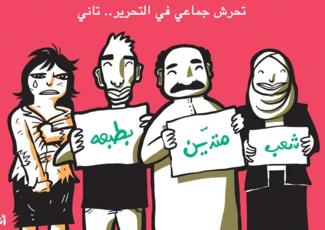At Least 9 Cases of Mob-Sexual Assault and Gang Rapes with Sharp Objects and Fingers this Week
 The undersigned organizations and groups have been monitoring the recent legal amendments in the Egyptian penal code related to crimes of sexual violence, and assert that the concerned amendment is an insufficient step in holding perpetrators of these crimes accountable, which have been conducted against at least 500 survivors during the period February 2011 to January 2014, and included gang rapes and mob-sexual assaults with sharp objects and fingers, in addition to the thousands of women who have been sexually harassed. Combating this phenomenon needs a holistic national strategy to combat it and comprehensive legal reform. Nevertheless, the undersigned organizations and groups are aware that the referred to amendment came as a result of continued pressure by feminist groups and organizations on the necessity of holding perpetrators of sexual violence crimes accountable, in addition to its widespread in the last three and a half years, which resulted in tragic consequences, such as the two crimes of murder of two women who were physically and verbally sexually harassed in Assuit and Gharbia governorates in 2012 and 2013, the crime of mob-sexual assault of a student in the Faculty of Law at Cairo University on March 16, 2014, and crimes of gang rapes and mob-sexual assaults in venues that witness large crowds and celebratory atmospheres, such as Tahrir Square and different venues, where more than 250 cases were documented to have taken place between November 2012 and January 2014. Crimes to be added to those previously mentioned are those that took place in the current week during the celebrations of the Egyptian president on June 3, 2014 which was aired live on some television channels while covering the celebrations, as well as the celebrations that took place yesterday on June 8, 2014 in Tahrir Square to celebrate the inauguration of the new president, where heinous mob-sexual assaults and gang rapes took place, where 9 cases were documented, similar to the referred to mob-sexual assaults and gang rapes with sharp objects and fingers, and which usually result in survivors’ sustaining severe physical injuries. It is worth mentioning that the state has continued in its inability to combat these crimes as a result of the absence of a holistic strategic mechanism.
The undersigned organizations and groups have been monitoring the recent legal amendments in the Egyptian penal code related to crimes of sexual violence, and assert that the concerned amendment is an insufficient step in holding perpetrators of these crimes accountable, which have been conducted against at least 500 survivors during the period February 2011 to January 2014, and included gang rapes and mob-sexual assaults with sharp objects and fingers, in addition to the thousands of women who have been sexually harassed. Combating this phenomenon needs a holistic national strategy to combat it and comprehensive legal reform. Nevertheless, the undersigned organizations and groups are aware that the referred to amendment came as a result of continued pressure by feminist groups and organizations on the necessity of holding perpetrators of sexual violence crimes accountable, in addition to its widespread in the last three and a half years, which resulted in tragic consequences, such as the two crimes of murder of two women who were physically and verbally sexually harassed in Assuit and Gharbia governorates in 2012 and 2013, the crime of mob-sexual assault of a student in the Faculty of Law at Cairo University on March 16, 2014, and crimes of gang rapes and mob-sexual assaults in venues that witness large crowds and celebratory atmospheres, such as Tahrir Square and different venues, where more than 250 cases were documented to have taken place between November 2012 and January 2014. Crimes to be added to those previously mentioned are those that took place in the current week during the celebrations of the Egyptian president on June 3, 2014 which was aired live on some television channels while covering the celebrations, as well as the celebrations that took place yesterday on June 8, 2014 in Tahrir Square to celebrate the inauguration of the new president, where heinous mob-sexual assaults and gang rapes took place, where 9 cases were documented, similar to the referred to mob-sexual assaults and gang rapes with sharp objects and fingers, and which usually result in survivors’ sustaining severe physical injuries. It is worth mentioning that the state has continued in its inability to combat these crimes as a result of the absence of a holistic strategic mechanism.
The undersigned groups and organizations continue in demanding from the state and national mechanisms to undertake the necessary procedures for the implementation of a holistic national strategy that includes the ministries of Health, Justice (including the Forensic Medicine Administration), Interior, and Education to eradicate this phenomenon, and implement a mechanism that guarantees women’s right to bodily integrity and existence in the public space, in addition to implementing a mechanism for gender budgeting, to allocate a specific budget that includes the publishing of statistical data and transparent information related to sexual violence against women, which is necessary for the effective design and implementation of the concerned strategy. They also assert the necessity of undertaking the required procedures and mechanisms to protect women who file reports of sexual harassment that they are subjected to, and legal cases they pursue, which have witnessed the pressure exercised by family members of the harassers to prevent the women who reported the cases to continue the concerned legal procedures, despite the issuance of restraining orders against them, which threatens the safety and security of women, and reflects a clear deficiency in the legal procedures concerning these crimes.
Moreover, the undersigned groups and organizations assert the necessity of amending articles 267 and 268 in the Egyptian penal code, to include a detailed and clear definition for rape, to include oral and anal rape, in addition to rape with sharp objects and fingers, and a clear definition for sexual assault, in addition to what was previously highlighted regarding the national strategy and state budget. The undersigned groups and organizations also demand that the National and Independent Fact-Finding Committee that was established by presidential decree no. 698 for the year 2013 by the previous president, and it was restructured by presidential decree no. 4 for the year 2014 – and which have elongated its investigation period until September 21, 2014 – to immediately investigate these crimes and guarantee holding perpetrators accountable, in addition to establishing an independent and specialized committee to investigate these crimes, due to their special nature that make it inevitable for the existence of specialized investigation mechanisms that suit the nature of these crimes.
Background to the Legal Amendments:
The previous president, Consultant Adly Mansour, issued a resolution that was published in the official gazette, issue no. 23 (bis) on June 5, 2014 stating an amendment in the Egyptian penal code, outlined in amending Article 306 (a) and adding Article 306 bis (b) to the Egyptian penal code to combat crimes of sexual harassment.
Amended Article 306 (a) bis in the Egyptian penal code states: to be punished by prison a duration not less than 6 months and a fine not less than 3000 Egyptian pounds and not to exceed 5000 Egyptian pounds, or one of these two punishments all those who confront others in a public space a private one or where one is present with permission by making forward actions, insinuations or hints that are sexual or pornographic whether by signals, words or action and by any means including wired and wireless communication methods.
And punishment is by prison not less than a year and a fine not less than 5000 Egyptian pounds and not to exceed 10000 Egyptian pounds and by one of these punishments if the crime is repeated by the perpetrator via following or stalking the harassed.
And in case the crime is repeated again, both punishments of imprisonment and fine payment are doubled in both their minimum and maximum forms.
And the term “confront others” is compliant with the philosophy of not specifying a certain gender to the crime of sexual harassment that many feminist organizations and groups have demanded for years. The amendment focused on increasing the maximum limit of punishment for the crime in its simple form, from two to three years and increasing the fine from 500 Egyptian pounds to 2000 Egyptian pounds and from 3000 Egyptian pounds to 5000 Egyptian pounds, and the legislator considered “stalking and following” a repetition of the crime, and increased the minimum limit of punishment to a year in addition to the fine, from 5000 to 10000 Egyptian pounds.
Furthermore, a new Article has been added in the Egyptian penal code, entitled Article 306 bis (b) which states: It is considered sexual harassment if the crime referred to in Article 306 bis (a) of this law is committed with the intention of the perpetrator receiving from the harassed benefit of a sexual nature, and the perpetrator is punished by prison not less than a year and a fine not less than 10000 Egyptian pounds, and not to exceed 20000 Egyptian pounds or one of both punishments.
And if the perpetrator is one of those referred to in the second paragraph of Article 267 of this law, or has occupational authority, familial, educational/mentoring, or practiced any kind of pressure on the harassed that would allow the context of committing the crime, or the crime is committed by 2 perpetrators or more, or if at least one of them had a weapon, punishment is not less than 2 years in prison and does not exceed 5 years, and punishment is not less than 20000 Egyptian pounds and does not exceed 50000 Egyptian pounds.
This article has introduced the term “harassment” for the first time in the Egyptian penal code, and the legislator tried to insert a definition for the criminalizing act of “sexual harassment”, however, unfortunately the definition is tied to the intention of the perpetrator to receive benefit of a sexual nature, which offers a big opportunity for interpretation of these incidents for the perpetrators’ intentions, instead of assessing the range of damage that has reached the harassed, and the discussion around the intention of the perpetrator in these crimes and interpretations made will render this article insufficient and limit the effectiveness of its application.
In the second paragraph, the legislator added “occupational authority of the perpetrator” as a new and aggravating condition for punishment, where occupational authority of the perpetrator could push him to harass co-workers or managers under pressure or within the work environment.
Groups and Organizations:
- Nazra for Feminist Studies.
- Andalus Institute for Tolerance and Anti-Violence Studies.
- Anti-Harassment Movement.
- Appropriate Communication Techniques Center for Development (ACT).
- Arab Network for Human Rights Information.
- Association for Freedom of Thought and Expression.
- Baheya Association for Culture and Citizenship.
- Baheya Ya Masr Movement.
- Banat Masr Khat Ahmar Movement.
- Cairo Center for Development and Human Rights.
- Cairo Institute for Human Rights Studies.
- CEDAW Coalition.
- Center for Egyptian Women’s Legal Assistance (CEWLA).
- Daughter of the Land Association.
- Egyptian Association for Community Participation Enhancement.
- Egyptian Association for Family Development.
- Egyptian Coalition for Children’s Rights.
- Egyptian Initiative for Personal Rights.
- Egyptian Women’s Union.
- ElNadeem Center for the Treatment and Rehabilitation of Victims of Violence and Torture.
- Harassmap.
- I Saw Harassment Initiative.
- Imprint Movement.
- Land Center for Human Rights.
- Legal Association for Family Assistance and Human Rights.
- Misryon Against Religious Discrimination.
- New Woman Foundation (NWF).
- Operation Anti-Sexual Harassment and Mob-Sexual Assaults (OpAntiSH).
- Tahrir Bodyguard.
- The Egyptian Foundation for the Advancement of Childhood Conditions.
- Women and Memory Forum (WMF).
Share this Post

